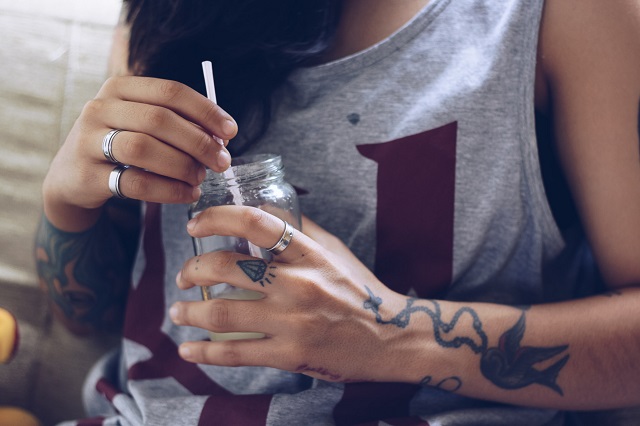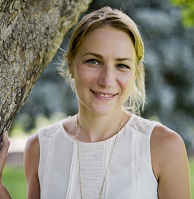Addiction is a roller-coaster ride that heads pretty much in one direction—at least for a while.
It typically starts as a good time, and then heads down into utter despair, humiliation and hopelessness. But if you’re lucky enough to hit the upswing, it can be life-changing.
For me, that last drink began my transformation from a beautiful, demoralized disaster into the grounded, empathetic woman I’ve become—and am thankfully still becoming.
When we’re younger, a lot of us spend time waiting for things to get started. For me that meant balancing graduate school during the day with working in fine dining at night. I was just your typical girl in her mid-twenties waiting to get a “real job” because I was still in school—the perfect front for a fear of growing up—and I was drinking less.
Drinking excessive amounts of wine, beer and cocktails is pretty much the norm in the service industry. It’s what you do after work, no matter what your age. You have fun every night—and end up dreading every morning. For some of us, those daily drinks turn into heavier and heavier drinking, which eventually turns into being a blackout drunk, like I was.
When you’re an addict, you drink alone and you drink with friends and, more often than not in the end, you just live to drink. Eventually, I stopped showing up for work. Instead, I drove to the liquor store and drank alone in my house. Most people would think, “Ugh, that sounds miserable. Why didn’t you try to stop?” Of course I tried, but I couldn’t…until I did.
There is a time in the life of most active alcoholics when we realize we can’t continue drinking if we want to survive.
At the same time, we can’t imagine how we survive without drinking. What happens to our social life? Can we go to concerts, or weddings, or parties? The idea of sobriety feels excruciating, but, ultimately, we realize we don’t have a choice. After years of struggling, it finally feels okay to try abstinence. At least it seems better than continuing as a hopeless, sick alcoholic.
So, I got sober for the last time in Maui, Hawaii, on Christmas Day 2009, and got ready to start living an incredibly boring life. But that’s not what happened. That’s not what happens.
The first year in early recovery, many of us experience a mild, but manageable, depression. Then things start to change. With so much more time on our hands sans drink, we have to come up with things to do while waiting (once again) to get back on our feet.
We develop routines like hiking every day, and we stick to them, even when we don’t want to. We look for work—work that will reignite our passion. We keep away from the people, places and things—like the service industry—that trigger us. We make connections with other people in the sober community. We begin to laugh again and develop a sense of self, of ourselves, without alcohol.
To someone who hasn’t stood up to the challenge of addiction, some of this stuff might seem average, or even simple. To an addict, it’s huge in the grand scheme of things.
My first job in my sobriety was as counselor in a correctional center working with folks who struggled with addiction. I loved that job, because I understood their struggle and I felt like I could actually make a difference. I connected with others on a deep and intimate level. I empathized—not just sympathized—and it felt as if, at the ripe age of 29, I was growing into the woman I was destined to become.
When we’re no longer drinking, we’re no longer hungover. We show up to work on time every day, instead of dreading waking up. We give it our all, and we get compensated for showing up, both professionally and spiritually. We no longer have to worry about getting fired or arrested. We go to bed with peaceful minds and wake up with clear heads. We begin looking forward to our days. We have control again.
Life becomes so much simpler when we get sober, too. We show up for the commitments we’ve made, and begin to develop meaningful, long-lasting relationships with others—men and women who have struggled with the same disease as we have, but are now living with the same hope and sense of purpose we are experiencing. We stop lying to ourselves, and everyone around us.
Most important for me, was that I stopped obsessing about alcohol, and began living in the present.
Life can be much more beautiful when we have the clarity and peace of mind to appreciate it. Everything we try to pray away in active addiction makes us who we are today, if we only pay attention.
If I had maintained my dream as a functioning alcoholic, I’d probably still be living in my hometown back in the Midwest, moderately depressed and more than moderately uninspired.
Today I am proud to be a licensed professional counselor in Denver, Colorado, and a woman in recovery. I am also 100 percent certain I would not be anywhere close to where I am today without the experiences I went through as a hopeless alcoholic.
I appreciate that, instead of killing me, the disease gave me new life. When we are pushed to our limit, we inevitably realize something has to change.
If we can find it within ourselves to make that change, we will find it’s worth every moment of the pain.
~
Author: Lindsay Melka
Image: Matheus Ferrero/ Unsplash
Editor: Khara-Jade Warren







Read 1 comment and reply